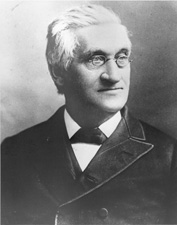Charles Van Wyck facts for kids
Quick facts for kids
Charles Henry Van Wyck
|
|
|---|---|
 |
|
| United States Senator from Nebraska |
|
| In office March 4, 1881 – March 3, 1887 |
|
| Preceded by | Algernon Paddock |
| Succeeded by | Algernon Paddock |
| Member of the U.S. House of Representatives | |
| In office February 7, 1870 – March 3, 1871 |
|
| Preceded by | George W. Greene |
| Succeeded by | Charles St. John |
| Constituency | 11th district |
| In office March 4, 1867 – March 3, 1869 |
|
| Preceded by | Charles H. Winfield |
| Succeeded by | George W. Greene |
| Constituency | 11th district |
| In office March 4, 1859 – March 3, 1863 |
|
| Preceded by | Ambrose S. Murray |
| Succeeded by | William Radford |
| Constituency | 10th district |
| Member of the Nebraska Senate | |
| In office 1877 1879 1881 |
|
| Personal details | |
| Born | May 10, 1824 Poughkeepsie, New York |
| Died | October 24, 1895 (aged 71) Washington, D.C. |
| Political party | Republican, Populist |
Charles Henry Van Wyck (May 10, 1824 – October 24, 1895) was an important American figure. He served as a Representative for New York, a Senator for Nebraska, and a Union Army brigadier general during the American Civil War.
Contents
Early Life and First Steps in Politics
Charles Henry Van Wyck was born in Poughkeepsie, New York. He went to Rutgers College in New Jersey and graduated in 1843. After college, he studied law and became a lawyer in 1847.
He then moved to Bloomingburg, New York. There, he worked as the district attorney for Sullivan County, New York from 1850 to 1856. A district attorney is a lawyer who represents the government in legal cases.
Van Wyck was elected to the U.S. House of Representatives from New York. He served two terms, from 1859 to 1863. While in Congress, he helped investigate fraud, which means dishonest actions, at the New York Custom House. He played a key role in passing the Fraud Claims Act. He strongly believed that people who cheated the nation during wartime were worse than enemies.
A Brave Stand Against Slavery
On March 7, 1860, Van Wyck gave a powerful speech in Congress. He spoke out strongly against slavery. He called it a "crime against the laws of God and nature." This speech was widely reported and made him many enemies.
On February 22, 1861, Van Wyck was attacked near the United States Capitol. Three men tried to harm him. He survived because a notebook and a copy of the Congressional Globe in his coat pocket stopped a knife. The attackers ran away and were never found. This attack happened on the same night as an alleged attempt to harm President-elect Abraham Lincoln in Baltimore.
Serving in the Civil War
When the American Civil War began, Van Wyck joined the Union Army. He became a colonel and led the 56th New York Infantry Regiment. His regiment was part of the Army of the Potomac.
He was wounded in the knee during the Battle of Fair Oaks. After that, he spent much of the war commanding troops in South Carolina. He took part in the Siege of Charleston Harbor and the Battle of Honey Hill. In 1865, he was honored with the rank of brigadier general for his service. He officially became a brigadier general before leaving the army in 1866.
Life After the War and Moving West
After the Civil War, Van Wyck was elected to Congress again. He served from 1867 to 1869 and again from 1870 to 1871.
In 1874, he moved to Nebraska. He bought a farm in Otoe County and became a farmer. He continued his political career in Nebraska. In 1875, he was a delegate to the State constitutional convention. This group helped write the state's constitution.
He was elected to the State senate in 1877, 1879, and 1881. In 1881, he was elected as a Republican to the United States Senate from Nebraska. He served as a U.S. Senator from 1881 to 1887. In the Senate, he chaired committees that focused on improving the Mississippi River. He tried to be reelected but was not successful.
In 1892, he ran for Governor of Nebraska as a Populist. The Populist Party was a political group that supported farmers and working people. He did not win the election. After this, he retired from politics and business. Charles Henry Van Wyck passed away in Washington, D.C.. He was buried in Milford Cemetery in Milford, Pennsylvania.
Gallery
See also
- Baltimore Plot
- List of American Civil War generals (Union)
Other sources
- Dictionary of American Biography; Harmar, Marie V. and James L. Sellers. "Charles Henry Van Wyck: Soldier-Statesman of New York and Nebraska."
- Nebraska Historical Magazine 12 (April–June 1929): 80-129, 12 (July–September 1929): 190-246, 12 (October–December 1929): 322-73.
 | Laphonza Butler |
 | Daisy Bates |
 | Elizabeth Piper Ensley |




